Posts Tagged ‘Karin Clark’
PEN Journey 35: Turkey Again: Global Right to Free Expression
PEN International celebrates its Centenary in 2021. I’ve been active in PEN for more than 30 years in various positions and now as an International Vice President Emeritus. With memories stirring and file drawers of documents and correspondence bulging, I am a bit of a walking archive and have been asked by PEN International to write down memories. I hope this personal PEN journey will be of interest.
PEN’s work attests to the power of the individual and also to a particular vision of globalization that advocates the global right to free expression, a right that supersedes national restrictions.
In February 2005 Orhan Pamuk, one of Turkey’s most noted writers, received threats and had his books burned by nationalist groups objecting to comments he made to a Swiss magazine while he was abroad. He referred to an Armenian “genocide.” While the Armenian community rallied to defend him, their support heightened certain nationalists’ protest in Turkey. Orhan wasn’t in Turkey at the time and hoped the turmoil would die down, but a government official in southern Turkey ordered the seizing of his books from local libraries so that they could be destroyed; it turned out later that there were none of his books in those libraries.
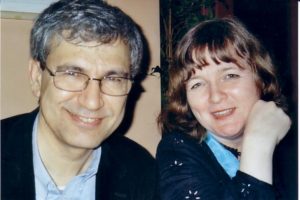
Novelist Orhan Pamuk and Sara Whyatt, International PEN Director of Writers in Prison Committee (Photo credit: Sara Whyatt)
At Pamuk’s request International PEN kept quiet publicly at first. In mid-April Sara Whyatt, International PEN’s Director of the Writers in Prison Committee (WiPC) and I had lunch with Orhan in London to discuss how PEN could help if the threat escalated. I was International Secretary of PEN at the time. We agreed that publicity at this stage could exacerbate the situation; however, we explained that PEN centers could work behind the scenes by direct contacts with their governments, and PEN would be prepared to step into public action should the need arise.
Pamuk intended to stay outside Turkey until late April/early May, but then he would be returning home to Istanbul. Sara stayed in touch with him and shared a plan for action if the threats resumed on his return. Meanwhile we told him PEN would continue to lobby for a change in the Turkish Penal Code that allowed the charges. Key PEN centers, who had good relations with their own governments, and centers from countries with influence in Turkey would make approaches. London’s WiPC would make similar approaches to Turkish officials in Ankara and also through mechanisms at the United Nations, OSCE, and the European Union (EU). At the time Turkey was hoping to become a member of the EU and was attempting to align its judiciary codes with those required by the EU. PEN also worked with the International Publishers Association .
PEN prepared a statement on the situation in Turkey from early 2005 and kept it updated with news and recommended actions for the over dozen PEN centers ready to respond on this case. There was also press guidance should the centers receive queries. Meanwhile PEN continued to work on the other cases of over 70 writers and intellectuals charged or in prison in Turkey, which had long been a country with a revolving door of writers harassed, detained, attacked and sent to prison.
On April 1, 2005 World Peace Day the Turkish press reported:
The investigation against author Orhan Pamuk due to this statement saying, ‘One million Armenians and 30,000 Kurds were killed’ [in Turkey] has ended with a case in which he is accused of violating article 301 of the new Penal Code (same as famous article 159 in the former one) “Insulting Turkish nationality” and with the demand of being imprisoned between six months and three years. The first hearing will take place at Istanbul Sisli No. 2 First Instant Criminal Court on December 16, 2005.
The Public Prosecutor claimed that Pamuk’s remarks in Switzerland’s Das Magazin were an infringement of Article 301/1 of the Turkish Penal Code which states that “the public denigration of Turkish identity” is a crime and that those found guilty should be given sentences ranging from 6-36 months.
With threats renewed by the Public Prosecutor and a lawsuit filed against Pamuk that could result in a three-year prison term, Orhan finally gave PEN the green light to launch its campaign. PEN centers mobilized globally, including in Turkey.
“It is a disturbing development when an official of the government brings criminal charges against a writer for a statement made in another country, a country where freedom of expression is allowed and protected by law,” I noted at the time.
Pamuk’s hearing in December, 2005 was approximately ten years after renowned Turkish writer Yaşar Kemal had been called to trial on similar charges in January 1995. Pamuk told a colleague he would underline two things in his statement:
1. What I said is not an insult, but the truth.
2. What if I were wrong? Right or wrong, do not people have the right to express their ideas peacefully in this Turkey?
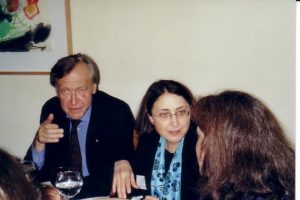
Eugene Schoulgin, PEN International Board Member and Müge Sökmen (Turkish PEN) at WiPC Conference, Istanbul, 2006 (Photo credit: Sara Whyatt)
At the judicial hearing, PEN members came to stand witness to the proceedings, including WiPC Chair Karin Clark, Turkish PEN President Vecdi Sayar, and International PEN board member and former WiPC Chair Eugene Schoulgin. Armored police officers escorted Orhan as protesters hurled a barrage of eggs and jumped on the car, punching the windshield.
PEN’s observers reported at the time: “The scenes around the first appearance of Orhan Pamuk before Sisli No. 2 Court of First Instance on 16 December 2005 at 11:00 were marked by constant shouting and scuffling turning ugly and violent at times. As those attending the proceedings left the court, eggs were hurled along with insults from the nationalists and fascists among the crowd lining the pavement across the street. This in full sight of the national and international media which had turned out in full…
“The courtroom was packed with well over 70 people—among them famous Turkish writers such as Yaşar Kemal and Arif Damar, and representatives of the European Parliament, several diplomats, members of Turkish and international freedom of speech organizations. The aggression and heckling inside and outside the court did not abate…”
The session ended after an hour and 15 minutes with an adjournment because the Ministry of Justice said that it needed more time to decide on the legal basis of the trial.
Hearing the news of postponement, International PEN President Jiří Gruša declared, “It is unbelievable that Orhan Pamuk, one of Turkey’s best known and eminent authors, is in this situation. What it indicates is a complete disregard for the right to freedom of expression not only for Pamuk, but also for the Turkish populace as a whole. This decision bodes ill for other writers who are being tried under similar laws.”
He added, “PEN demands that the trials against all writers, publishers and journalists be halted and that the laws under which they are being tried be removed from the Penal Code. We also call on the Turkish authorities to put a definitive end to the penalization of those who exercise their right to freedom of expression.”
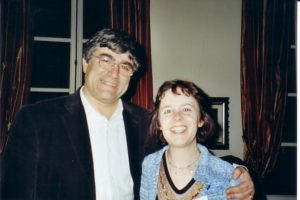
Hrant Dink, Journalist and Editor-in-chief Argos and Hilde Keteleer (Belgian Flemish PEN) at PEN WiPC Conference in Istanbul, Spring 2006 (Photo credit: Sara Whyatt)
At the time there were 14 other writers, publishers and journalists on trial under the newly revised “insult” law for criticizing the Turkish state and its officials. These included Ragip Zarakolu, publisher of books by Armenian authors and Hrant Dink, editor of an Armenian language newspaper, who was assassinated two years later.
For Pamuk the charges were dropped in January 2006, though on a technicality rather than on legal grounds protecting freedom of expression. The widespread opposition to Pamuk’s prosecution by PEN and other organizations succeeded, but as Turkish PEN President Vecdi Sayar noted in The New York Times: “There are many people abroad who fail to see beyond Orhan Pamuk’s trial. Saving a writer like Orhan Pamuk from prosecution may stand as a symbolic example on its own. But it is not an overall resolution for other intellectuals and writers that still face similar charges in Turkey.”
In March 2006 Orhan was the featured guest at PEN International’s Writers in Prison Committee’s biennial conference held in Istanbul, hosted by Turkish PEN.
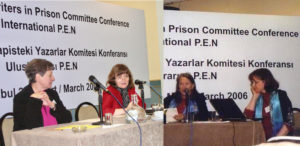
Writers in Prison Conference Istanbul 2006. L to R: Karin Clark (International PEN Chair WiPC), Sara Whyatt (Director WiPC), Joanne Leedom-Ackerman (International Secretary International PEN), and Sara Wyatt (Photo credit: Sara Whyatt)
On October 12, 2006 Orhan Pamuk won the Nobel Prize for Literature.
It could be said that the case of Orhan Pamuk signaled a long ride to the end of Turkey’s potential membership in the EU. In September 2006 the European Parliament called for the abolition of laws such as Article 301 “which threaten Europe’s free speech norms.” In 2008, the law was reformed, but according to the reform, it remained a crime to explicitly insult the “Turkish nation” rather than “Turkishness,” and in order to open a court case based on Article 301, a prosecutor was required to have approval of the Justice Minister; a maximum punishment was reduced to two years in jail. In November 2016 the members of the European Parliament voted to suspend negotiations with Turkey over human rights and rule of law concerns. In February 2019 the European Union Parliament committee voted to suspend accession talks with Turkey.
Turkey continues to be one of the most problematic countries for writers, especially on certain topics. While Turkey’s Penal Code relaxed for a while, allowing more space and freedom for writers, in the last years, the code and its execution has grown more onerous than ever.
*****
In that spring of 2005, I attended an event celebrating Press Freedom Day (May 3), hosted by Italian PEN in Venice. There I shared testimonials from writers on whose behalf PEN had worked. I share these again here:
** Cuban journalist and poet Jorge Olivera Castillo was conditionally released from prison in December 2004 after serving 20 months of an 18-year sentence. He wrote:
Your solidarity has been a light in the darkness. Thank you for having elected me as an Honorary Member…[I send] to all of you my gratitude for your messages of support and your unflagging concern.
** Nkwazi Mhango, Tanzanian journalist in exile, wrote:
Believe it or not tears are gushing as I am writing this message. No way in whatsoever manner my family and I can reciprocate your love and commitment to our plight. THANKS AGAIN AND AGAIN AND AGAIN MORE.
** On a sadder note the following was received from Tunisian internet writer Zouhair Yahyaoui, who died suddenly in March 2005 from a heart attack after he’d been released from prison:
Your email gave me once again a lot of hope for a better future in my country at a time when the dictatorship uses all illegal and barbaric means to make us give up and abandon all forms of protest…The fact that I continue to struggle to obtain our right to freedom of expression, here in Tunisia, is thanks to support of members of International PEN and other international organizations. Thank you again to you, to the Writers in Prison committee of International PEN and to all the PEN clubs all over the world who have supported me enormously during my imprisonment and who continue to do so.
** And from Chinese writer Jiang Qisheng:
… I am not a remarkable person. I am just an ordinary guy who did something extraordinary because it was the right thing to do…If my own case has any special significance it is only that it forces people to face a highly embarrassing fact—the fact that even now, in the dawn of the 21st century, a Chinese citizen can be imprisoned for what he says.
** I ended with a passage from the book This Prison Where I Live, the collection of prison writings drawn together by International PEN’s Writers in Prison Committee. In the afterword Malawian poet Jack Mapanje, who himself was in prison during the autocratic rule in his country, tells how bits of news managed to get smuggled into him in his concrete cell filled with spiders and cockroaches, scorpions and bats and bat droppings.
I found the note, unusually fat…I found a bulletin of typed world news and two poems by Brecht…Pat also enclosed two honorary membership cards from International PEN’s English and American centers, issued in London and New York respectively. They each bore my name. I had been made a member of PEN. Well, well, well!…
Then there was a cutting from Britain’s Guardian newspaper. Lord Almighty! A picture of Ronald Harwood, Harold Pinter, Antonia Fraser, and other members of English PEN reading from my book of poems in protest at the Malawi High Commission in London! It must sure have an effect, I thought. Ten thousand miles away, among the cockroaches of the prison where I lived I felt utterly humbled. Shattered. Such generosity, such warmth I surely did not deserve. All for one slim volume of poems? Why hadn’t I written more poems? I was dumbstruck. Despair vanquished. ‘I am belonged,’ I heard myself whisper.
Next Installment: PEN Journey 36: Bled: The Tower of Babel—Part One
PEN Journey 31: Tromsø, Norway: Northern Lights
PEN International celebrates its Centenary in 2021. I’ve been active in PEN for more than 30 years in various positions and now as an International Vice President Emeritus. With memories stirring and file drawers of documents and correspondence bulging, I am a bit of a walking archive and have been asked by PEN International to write down memories. I hope this personal PEN journey will be of interest.
The week before PEN’s 70th World Congress in Tromsø, Norway in the Arctic Circle, my oldest son competed in the Athens 2004 Olympic Games, the only wrestler to qualify for TeamGB (Great Britain). He had dual citizenship and was the first British champion to qualify for the Olympics in wrestling in eight years. In his sport, there was no seeding of competitors; instead, after making weight, each wrestler reached into the equivalence of a hat and drew their first round competitions. True to his history, my son drew the best opponents. As one news commentator noted: “Coming to the mat is Nate Ackerman, born in the US, wrestling for Great Britain, getting his PhD in mathematics at the Massachusetts Institute of Technology…but that won’t help him now as he faces the three-time World Champion from Armenia.” My son lost to the Armenian wrestler. His other opponent was the world bronze medalist from Kazakhstan who went on to win the silver medal at the Olympics. Though my son didn’t win either match, he also didn’t get pinned, and he wrestled nobly. The Olympic Games in Athens was a magical time.

Olympic circles projected in light on the Acropolis at the 2004 Olympic Games in Athens
I was heading to Tromsø with a smile inside, though behind my smile was also a quiet attention that never left me for my youngest son, a Marine, was in Anbar Province, Iraq that summer, patrolling in 120° and alert for IED’s and snipers along the roadside. He had missed his brother in the Olympics and his brother missed being able to talk with him.
As I changed planes in northern Europe, I realized I was going to need a coat in the Arctic Circle and bought a light foldable one at an airport shop which I took to a decade worth of PEN Congresses after. On the plane I reviewed the stack of PEN papers and resolutions.
I was arriving at the Congress having agreed to stand for International Secretary. (See PEN Journey 30). The other PEN member standing was Giorgio Silfer, a poet and playwright and president of Esperanto PEN.
Norwegian PEN hosted over 300 writers, editors, and translators from at least 60 countries for the 70th World Congress whose theme was Writers in Exile—Writers in Minority Languages. The Rica Arctic Hotel where we stayed and met was an easy walk to the small downtown of Tromsø, capital of northern Norway, well above the Arctic Circle and called “the Paris of the North.”
Kjell Olaf Jensen, President of Norwegian PEN, reminded delegates that the Congress themes reflected the literary scene of Tromsø, which would soon join the International Network of Cities of Asylum as the fifth Norwegian city. (This network later developed into the International Cities of Refuge Network (ICORN) in 2006 with PEN’s Writers in Prison Committee as a partner and with the inaugural meeting in Stavanger, Norway.) One of the guiding voices in the exile network Professor Ole Danbolt Mjøs, director of Tromsø University’s Peace Center and President of the Norwegian Nobel Committee, spoke at the Welcome Party Ceremony as did Ole Henrik Magga, President of the Sami Parliament. Half of the estimated 50,000 Sami in the world lived in Norway. Crown Prince Haakon of Norway officially opened the Congress the next day noting, “Freedom of speech is a source of power. If used constructively, it is amazing what speech can do. It can fight corruption, free political prisoners, and make oppressive regimes crumble.”
The two themes of writers in exile and writers in minority languages intertwined throughout the Congress with readings and round tables at cafes and pubs in the midst of Tromsø’s annual International Literary Festival and the International Nana Festival of Aboriginal people. Literary and musical programs included the Sami singer Mari Boine in the Arctic Cathedral and the work of the celebrated but deceased Sami poet, singer, and writer Nils Aslak Valkeapaa. PEN’s programs highlighted some of Norway’s own writers in exile: Mansur Rajih from Yemen, Soudabeh Alishahi from Iran, Islam Elsanov, a film maker from Chechnya, and Chenjerai Hove from Zimbabwe as well as guests Reza Baraheni (Iranian writer living in Canada), Turkish activist Şanar Yurdatapan, and former Russian prisoner and writer Grigory Pasko.
A conference at Tromsø University under the theme “Should Writers Live in Prison?” preceded the Opening Ceremony. Storyteller Easterine Iralu of the “Nagaland nation” addressed the delegates in the main lecture hall: “Every man is a story and every nation is a bristling galaxy of stories. Every nation should be given the right to tell the story by its own story tellers…We are an oral society. Naga writing is an aboriginal achievement.”
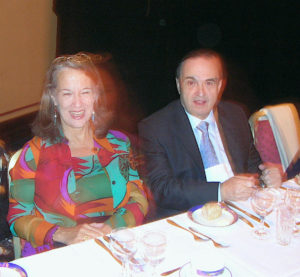
New PEN International Secretary Joanne Leedom-Ackerman and PEN International President Jiří Gruša at 70th PEN Congress in Tromsø, Norway, 2004
In later panels Lebanese novelist Amin Maalouf said, “Poets and writers must reinvent the world. This is not a task to be left to politicians. Is this a century of bombs or poems?” Norwegian bestselling author Jostein Gaarder expanded the questions: “How wide are the ethical horizons of literature and art? The question for writers and artists at the start of the third millennium must be what shift in consciousness do we need? Literature is nothing less than a celebration of mankind’s consciousness. So shouldn’t an author be the first to defend human consciousness against annihilation?”
At his first Congress as PEN International President Jiří Gruša told the delegates, “I myself have experienced persecution and really esteem people who help authors to freedom. I know how vital it is to have somebody outside the prison who cannot be stopped. ” He challenged writers to invent and combine practical and stylistic literary methods “to conquer plagues and pestilence that threaten human, moral and planetary evolutions.” He and the delegates of the Congress condemned recent terrorist attacks on a school in Beslan, Russia which had taken the lives of hundreds of children just a few days before. Jiří also paid respect to poet, Nobel laureate and PEN member Czeslaw Milosz, who had recently passed away. “It is with deep grief that the PEN family sympathizes with the people of Poland. We shall miss him, but his work will continue to inspire people from one end of the world to the other.” Milosz was a member of the Writers in Exile American Branch of PEN.
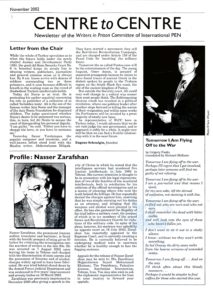
Writers in Prison Centre to Centre newsletter featuring poem by Grigory Pasko, honored guest at 70th PEN Congress and article about prisoner Nasser Zarafshan.
In addition to attending the rich literary panels and discussions, PEN’s Assembly of Delegates passed a resolution that urged authorities to assist in freeing Christian Chesnot and Georges Malbrunot, two French journalists currently held hostage in Iran. Encouraged by Nicaraguan poet Ernesto Cardenal, delegates and participants also signed a petition to the Islamic Republic of Iran demanding that Dr. Nasser Zarafshan’s life be protected and that he be immediately and unconditionally released. Delegates also signed a petition to the President and Government of Russia calling for a multilateral dialogue and an end to the violence in Northern Caucasia and a restoration of civil living conditions in the Chechnyan Republic, including open access so that local and national media could report events in the region. (Chesnot and Malbrunot were released from Iran a few months after the Congress, in late December, 2004. Zarafshan was not released until 2007.)
The Assembly passed resolutions from the Translation and Linguistic Rights Committee (TLRC) urging authorities of the Russian Federation to grant cultural rights to all minorities, including use of regional languages, and the same appeal was sent to authorities in Turkey, Iran and Syria regarding Kurdish language and culture.
Writers in Prison Committee (WiPC) resolutions which the Assembly passed focused on the repression of free expression for writers seeking asylum in Australia, on harassment of certain journalists in Canada, attacks on writers in Chechnya, imprisonments in China and Cuba, censorship and harassment of writers in Egypt, arrests in Eritrea, hostage-taking in Iraq, detentions in the Maldives, killings in Mexico, detention and ill treatment in Myanmar, murder in Nepal, killing and disappearances in Russia, bombings and assassinations in Spain, imprisonments in Turkey, restrictions on the free flow of international writing in the U.S., imprisonments in Uzbekistan and Vietnam, and restrictions on free expression in Zimbabwe.
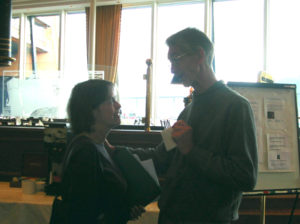
Administrative Director Jane Spender and PEN International Secretary Terry Carlbom at 70th PEN Congress in Tromsø, Norway, 2004
The WiPC resolutions had been discussed at the earlier Writers in Prison Committee meeting where a new chair had been elected from four candidates. Karin Clark of German PEN would replace Eugene Schoulgin, who was stepping down after four years and was running for the Board of International PEN.
At the Assembly of Delegates, Eugene introduced guest of honor, former Russian main case and journalist Grigory Pasko, who told the delegates that “although he had not been able to thank all those who had worked on his behalf while he was in prison, he now would like to thank everyone again and again. Unfortunately he could not now say that Russia had become more democratic, but he would continue to fight to make it so, supported by all his friends in the Assembly hall.”
Election for the Board of PEN included eight candidates for three open positions. Eric Lax (PEN USA West), Judith Rodriguez (PEN Melbourne), and Eugene Schoulgin (Norwegian PEN) joined the Board. Three new centers—Basque, Guatemala and Kosovo—were admitted into PEN.
At his last Assembly as International Secretary Terry Carlbom told the delegates, “Our greatest strength is ultimately our capacity for empathy, compassion and solidarity. Ours is not the solidarity of the collective herd; it is the solidarity of the concerned and caring individual, a solidarity with a fragile world and fragile civilization. And the solidarity that sometimes can provide comfort in the rather lonely process of creative writing…I have been proud to serve.”
At the Congress Terry saw the passage of the final amending resolutions on the Regulations and Rules of Procedure he had dedicated a significant portion of time to as International Secretary. Updating rules and regulations to bring them in line with the changes PEN had made to its governance was not a task for many writers. I was grateful to Terry that these documents were now drafted and a working document for strategic planning was in hand.
The election for Terry’s replacement as International Secretary was between Giorgio Silfer (Esperanto PEN) and myself. Giorgio’s speech to the Assembly was a poem, an unusual and memorable presentation for office. Giorgio was a linguist and a poet and participated actively on the Peace Committee and Translation and Linguistic Rights Committee. I was a novelist and journalist and activist on the Writers in Prison Committee and Women’s Committee. We had both worked with all committees, but we had our corridors and respected each other. My statement was more traditional.
I was elected the new International Secretary of PEN. I glimpsed the work ahead when I sat down with Terry in the hotel lounge after the election. He told me in November I needed to be at Senegal PEN‘s conference with African centers in Dakar in preparation for the 2007 PEN Congress there, and in the spring I was in charge of a conference PEN was holding in Diyarbakir, Turkey with Kurdish and Turkish PEN. Great, I said. Can you show me the budget and program for the Diyarbakir conference? Terry explained that we didn’t have a budget yet, but he offered to continue helping with this conference. I was to learn quickly that unlike the Writers in Prison Committee, the rest of International PEN worked in a more unstructured fashion, without clear budgets but with relationships that usually came through. I began making lists. My tenure as International Secretary would include notebook after notebook of lists of tasks to be done.
A solace as I left that meeting was that I would be working with Jane Spender, Administrative Director, who was smart, a friend, and had gotten PEN through remarkably tight places before. Jane and I both knew that time was not on our side if we didn’t modernize further. I put on my new PEN coat and went for a brisk walk with Jane in the drizzle towards the next venue. PEN International had been asked for the first time by a major funder to provide an evaluation of a major grant. No one before had asked that of PEN, but it would surely be asked more and more in the future. We walked down the wet Tromsø streets considering what was before both of us. We had to figure out how to do an evaluation and much more…
Next Installment: PEN Journey 32: London Headquarters: Coming to Grips